论《奥赛罗》的悲剧根源:自卑
奥赛罗悲剧的病态人格根源
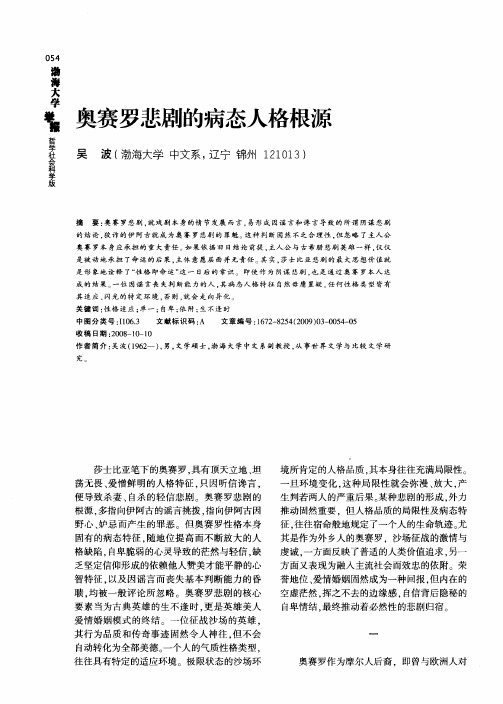
征, 往往宿命般地规定了一个人的生命轨迹 。 尤 其是作为外乡人 的奥赛罗 .沙场征战的激情与 虔诚 , 一方面反映了普适的人类价值追求 . 另一 方面又表现为融入主流社会而效忠的依附。荣 誉地位 、 爱情婚姻固然成为一种回报 。 但内在的 空虚茫然 . 挥之不去 的边缘感 , 自信背后隐秘的 自卑情结 , 最终推动着必然性 的悲剧归宿。
聩, 均被一般评论所忽略。奥赛罗悲剧 的核心 要 素 当为古 典英 雄 的生 不逢 时 。 是 英 雄 美 人 更 爱情 婚 姻模 式 的终 结 。 一位 征 战 沙 场 的英 雄 ,
其行为品质和传奇事迹 固然令人神往 . 但不会 自动转化为全部美德。 一个人 的气质性格类型, 往往具 有 特定 的适 应环 境 。极 限状态 的沙场 环
05 4
渤 海 大学
—罕 厶 版 丐 社蕈
奥 赛
吴 波 ( 渤海大学 中文系, 辽宁 锦州 1 l 1 2 1 3) 3
罗
居刀 . ^' -= jl I 丙 ¨ = Ⅱ
摘 要 : 赛 罗悲 剧 , 戏 剧 本 身的 情 节 发展 而 言 , 奥 就 易形 成 因谣 言和 谗 言 导 致 的 所 谓 阴谋 悲剧
续的热情。对亲友忠心耿耿 , 坦诚相待 , 对敌人 则势不两立 , 必将其置 于死地而后快。 正是这一 性格品质 , 使他收获了巨大的威望和尊重。 执掌
态 ,另一方面又作为城邦征战工具备受重视与 赏识 , 故其心灵始终表现为分裂和焦虑。 虽然以
宗教名义延续的数百年东西方圣战 、远征已近
帅印, 成为国家栋梁, 赢得标志性人物苔丝狄蒙
智 特征 . 以及 因谣 言 而丧 失 基 本 判 断 能力 的 昏
境所肯定的人格 品质 , 其本身往往充满局限性。 旦 环 境变 化 , 种 局 限性 就 会 弥 漫 、 大 , 这 放 产
解析莎士比亚《奥赛罗》的悲剧性

解析莎士比亚《奥赛罗》的悲剧性作者:庄雯戈来源:《北方文学》2017年第12期摘要:本文借助亚里士多德悲剧理论中的“悲剧人物的性格”和“过失说”、“卡塔西斯说”对莎士比亚的四大悲剧之一《奥赛罗》进行分析,探讨《奥赛罗》内在的悲剧性。
关键词:亚里士多德;悲剧;奥赛罗;莎士比亚《诗学》是亚里士多德一部重要的文艺理论著作,该书详细的阐释了亚里士多德的悲剧理论,其中提出的许多观点都对后来的剧作家创作戏剧产生了深远的影响。
莎士比亚一直是西方甚至世界经典的中心,其悲剧在一定程度上渗透着亚里士多德所提出的悲剧理论,本文借助莎士比亚四大悲剧之一《奥赛罗》来进行分析。
亚里士多德认为悲剧是对行动的摹仿,行动又是某些人物表现的,“这些人物必然在‘性格’和‘思想’两个方面都具有某些特点”。
悲剧人物的性格特点概括来说,一是必须善良,二是必须合适,三是必须与一般人相似,四是性格必须一致,即使有矛盾也要合乎必然律和可然律。
莎士比亚笔下的奥赛罗是作为一个英雄人物出场的,虽然身为摩尔人,但奥赛罗在战场上英勇无畏、所向披靡,最终战功显赫,得到了公爵和国家的承认。
奥赛罗品质高尚,没有嫉妒心,不会猜疑别人干卑鄙的勾当,正像他自己不会干这种事一样。
因此奥赛罗在与苔丝狄蒙娜谈情说爱时,还常常请卡西奥帮忙,并无任何顾虑。
这样的奥赛罗应该可以说算得上一个好人了。
他的性格也与自己的身份、气质、教养、性别、年龄十分贴合,就这位勇敢的摩尔人而言,这种天真坦率对人毫不猜疑根本不是缺点,而是一种光彩。
奥赛罗的旗官伊阿古,由于嫉妒奥赛罗提拔了卡西奥任副将而未关注自己,从而心生怨恨,想方设法制造假象令奥赛罗误以为卡西奥与苔丝狄蒙娜私通,被妒恨迷失了心智的奥赛罗最终亲手掐死了自己无辜的妻子。
如果奥赛罗性格懦弱,那么他就算心里怀疑,也不敢杀害苔丝狄蒙娜,可他偏偏是个武将,英勇血性,“我有一天感到怀疑,就要把它立刻解决。
要是我会让这种捕风捉影的猜测支配我的心灵”。
探索分析《奥赛罗》悲剧发生的原因
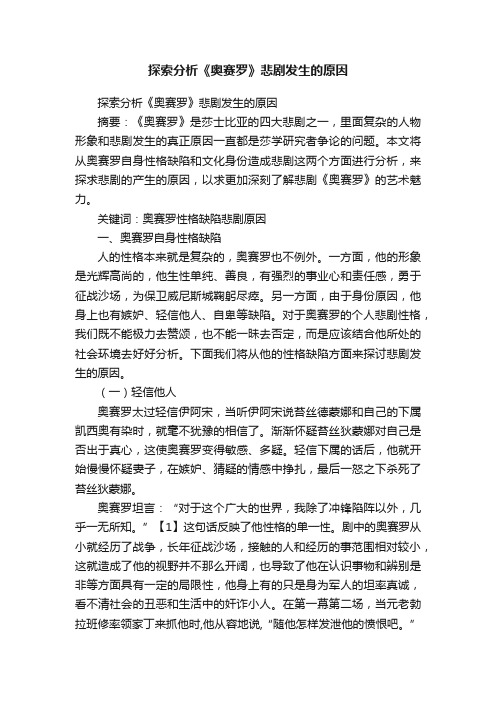
探索分析《奥赛罗》悲剧发生的原因探索分析《奥赛罗》悲剧发生的原因摘要:《奥赛罗》是莎士比亚的四大悲剧之一,里面复杂的人物形象和悲剧发生的真正原因一直都是莎学研究者争论的问题。
本文将从奥赛罗自身性格缺陷和文化身份造成悲剧这两个方面进行分析,来探求悲剧的产生的原因,以求更加深刻了解悲剧《奥赛罗》的艺术魅力。
关键词:奥赛罗性格缺陷悲剧原因一、奥赛罗自身性格缺陷人的性格本来就是复杂的,奥赛罗也不例外。
一方面,他的形象是光辉高尚的,他生性单纯、善良,有强烈的事业心和责任感,勇于征战沙场,为保卫威尼斯城鞠躬尽瘁。
另一方面,由于身份原因,他身上也有嫉妒、轻信他人、自卑等缺陷。
对于奥赛罗的个人悲剧性格,我们既不能极力去赞颂,也不能一昧去否定,而是应该结合他所处的社会环境去好好分析。
下面我们将从他的性格缺陷方面来探讨悲剧发生的原因。
(一)轻信他人奥赛罗太过轻信伊阿宋,当听伊阿宋说苔丝德蒙娜和自己的下属凯西奥有染时,就毫不犹豫的相信了。
渐渐怀疑苔丝狄蒙娜对自己是否出于真心,这使奥赛罗变得敏感、多疑。
轻信下属的话后,他就开始慢慢怀疑妻子,在嫉妒、猜疑的情感中挣扎,最后一怒之下杀死了苔丝狄蒙娜。
奥赛罗坦言:“对于这个广大的世界,我除了冲锋陷阵以外,几乎一无所知。
”【1】这句话反映了他性格的单一性。
剧中的奥赛罗从小就经历了战争,长年征战沙场,接触的人和经历的事范围相对较小,这就造成了他的视野并不那么开阔,也导致了他在认识事物和辨别是非等方面具有一定的局限性,他身上有的只是身为军人的坦率真诚,看不清社会的丑恶和生活中的奸诈小人。
在第一幕第二场,当元老勃拉班修率领家丁来抓他时,他从容地说,“随他怎样发泄他的愤恨吧。
”旗官伊阿古劝他躲避一下风头时,他却坦然地说:“不,我要让他们看见我;我的人品、我的地位和我的清白的人格可以替我证明一切。
”【2】(283-284)这足以证明他宽宏大度、生性坦白的特点。
他正直、光明磊落、简单、单纯的性格也是容易被人利用的弱点。
奥赛罗读后感800字
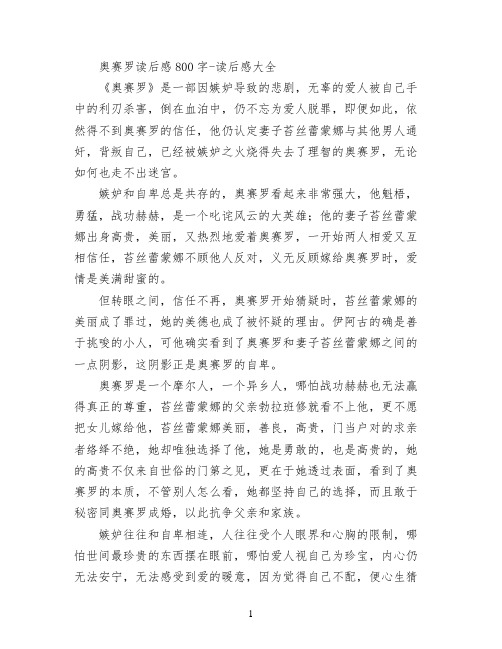
奥赛罗读后感800字-读后感大全《奥赛罗》是一部因嫉妒导致的悲剧,无辜的爱人被自己手中的利刃杀害,倒在血泊中,仍不忘为爱人脱罪,即便如此,依然得不到奥赛罗的信任,他仍认定妻子苔丝蕾蒙娜与其他男人通奸,背叛自己,已经被嫉妒之火烧得失去了理智的奥赛罗,无论如何也走不出迷宫。
嫉妒和自卑总是共存的,奥赛罗看起来非常强大,他魁梧,勇猛,战功赫赫,是一个叱诧风云的大英雄;他的妻子苔丝蕾蒙娜出身高贵,美丽,又热烈地爱着奥赛罗,一开始两人相爱又互相信任,苔丝蕾蒙娜不顾他人反对,义无反顾嫁给奥赛罗时,爱情是美满甜蜜的。
但转眼之间,信任不再,奥赛罗开始猜疑时,苔丝蕾蒙娜的美丽成了罪过,她的美德也成了被怀疑的理由。
伊阿古的确是善于挑唆的小人,可他确实看到了奥赛罗和妻子苔丝蕾蒙娜之间的一点阴影,这阴影正是奥赛罗的自卑。
奥赛罗是一个摩尔人,一个异乡人,哪怕战功赫赫也无法赢得真正的尊重,苔丝蕾蒙娜的父亲勃拉班修就看不上他,更不愿把女儿嫁给他,苔丝蕾蒙娜美丽,善良,高贵,门当户对的求亲者络绎不绝,她却唯独选择了他,她是勇敢的,也是高贵的,她的高贵不仅来自世俗的门第之见,更在于她透过表面,看到了奥赛罗的本质,不管别人怎么看,她都坚持自己的选择,而且敢于秘密同奥赛罗成婚,以此抗争父亲和家族。
嫉妒往往和自卑相连,人往往受个人眼界和心胸的限制,哪怕世间最珍贵的东西摆在眼前,哪怕爱人视自己为珍宝,内心仍无法安宁,无法感受到爱的暖意,因为觉得自己不配,便心生猜忌,惶恐不安,她那么好,一定不会真的那么爱我的,甚至连猜疑,都说不出口。
伊阿古亦是如此,剧中对他的妻子艾米莉亚着墨不多,但足以让人们了解,她是一个忠心的侍从,一个好妻子,更重要的是,她是一个明辨是非的人,更有一颗勇敢的心。
面对丈夫的恶行,她不偏私:“要是他果真说了这样的话,愿他恶毒的灵魂每天一分一寸地糜烂!”面对刚杀害了妻子地奥赛罗,她也毫无惧色,大声痛斥他:“你没有半分力量可以伤害我,我也绝不能让人家把我欺侮。
奥赛罗任务性格分析

自卑——人类亘古的弱点——读《奥赛罗》有感14121359 李玮当主人公奥赛罗在苔丝狄蒙娜的卧室中以一种病态的语调,自言自语道“我要杀死你,然后再爱你!”的时候,不仅让人感慨不已。
奥赛罗爱不爱苔丝狄蒙娜?爱!苔丝狄蒙娜爱不爱奥赛罗?很爱!两个生死相爱的人,却没有走向幸福美满的结局,可悲可叹。
在莎士比亚的剧作中,成功的人物形象通常具有十分复杂的性格系统。
一种性格是优点,如果发挥到极致,则往往转化成弱点甚至缺点。
因此,论者和观众面对的奥赛罗并不是一个单面人。
他之所以有着无穷的性格魅力,是因为其复杂性和多维性。
其震撼力在于其性格矛盾冲突的尖锐性,这实质上是人文主义与新旧价值观念的矛盾。
奥赛罗这一人物则是体现这些矛盾与冲突的一个统一体。
奥赛罗的高尚品德使人景仰,而他性格弱点造成的悲剧又激起人的同情与怜悯。
这就是摆在读者、观众和评论家面前的奥赛罗。
作为一个异族人,甚至一个黑人,能够在威尼斯取得统帅的地位,这已经足以证明奥赛罗的非凡能力。
但是他却是一个悲剧的主人公。
在未结识苔丝狄蒙娜之前,他虽然饱受生活的磨难,依然生机勃勃,虽然他的肉体会遭受束缚,但他的灵魂依然自由自在,洒脱不羁。
他是大漠上的一只雄鹰,无垠的苍穹是他飞翔的园地;他是草原中的一只雄狮,宽阔的世界为他而开放。
那时的他无所依托,无所牵拌。
也正是他的无所牵挂,才能让他在与周围格格不入的环境中展翅翱翔。
但当他的内心开始有了依托,当他把自己的软弱给苔丝狄蒙娜分享之后,他的心态便和原来的孤家寡人不同了。
他们互相相爱,打破重重封建束缚而结合,他们非常珍视这来之不易的爱情。
正是如此,奥赛罗便对自己,也对苔丝狄蒙娜格外严格,他的眼中容不下一颗沙子。
在听到伊阿古说“跟她睡”,奥赛罗很自然就想到了“在一床”;伊阿古说“睡在一床,睡在她身上”,奥赛罗就更加大肆发挥他诗人的想象力了。
在理智昏沉的情况下,奥赛罗疯狂了,甚至没考虑过伊阿古话语的真实性,就气愤的说:我要撕她的皮,割她的肉。
探析《奥赛罗》中苔丝狄蒙娜悲剧的成因
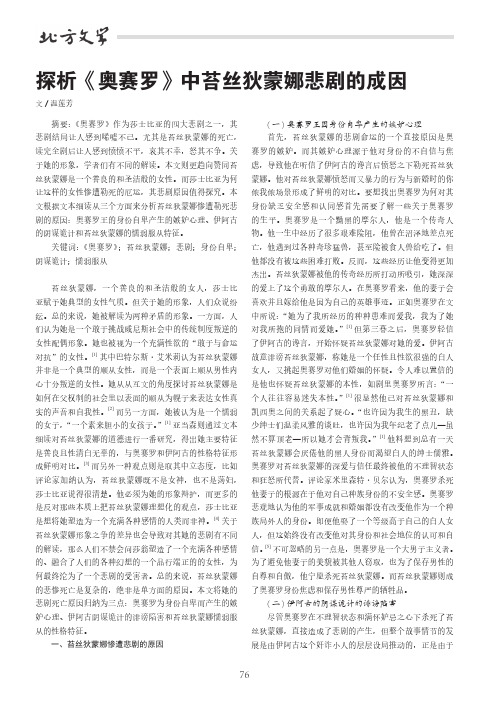
探析《奥赛罗》中苔丝狄蒙娜悲剧的成因文/温莲芳摘要:《奥赛罗》作为莎士比亚的四大悲剧之一,其悲剧结局让人感到唏嘘不已。
尤其是苔丝狄蒙娜的死亡,读完全剧后让人感到愤愤不平,哀其不幸,怒其不争。
关于她的形象,学者们有不同的解读。
本文则更趋向赞同苔丝狄蒙娜是一个善良的和圣洁般的女性。
而莎士比亚为何让这样的女性惨遭勒死的厄运,其悲剧原因值得探究。
本文根据文本细读从三个方面来分析苔丝狄蒙娜惨遭勒死悲剧的原因:奥赛罗王的身份自卑产生的嫉妒心理、伊阿古的阴谋诡计和苔丝狄蒙娜的懦弱服从特征。
关键词:《奥赛罗》;苔丝狄蒙娜;悲剧;身份自卑;阴谋诡计;懦弱服从苔丝狄蒙娜,一个善良的和圣洁般的女人,莎士比亚赋予她典型的女性气质。
但关于她的形象,人们众说纷纭。
总的来说,她被解读为两种矛盾的形象。
一方面,人们认为她是一个敢于挑战威尼斯社会中的传统制度叛逆的女性配偶形象。
她也被视为一个充满性欲的“敢于与命运对抗”的女性。
[1]其中巴特尔斯·艾米莉认为苔丝狄蒙娜并非是一个典型的顺从女性,而是一个表面上顺从男性内心十分叛逆的女性。
她从从互文的角度探讨苔丝狄蒙娜是如何在父权制的社会里以表面的顺从为幌子来表达女性真实的声音和自我性。
[2]而另一方面,她被认为是一个懦弱的女子,“一个素来胆小的女孩子。
”[1]亚当森则通过文本细读对苔丝狄蒙娜的道德进行一番研究,得出她主要特征是善良且性清白无辜的,与奥赛罗和伊阿古的性格特征形成鲜明对比。
[3]而另外一种观点则是取其中立态度,比如评论家加纳认为,苔丝狄蒙娜既不是女神,也不是荡妇,莎士比亚说得很清楚。
他必须为她的形象辩护,而更多的是反对那些本质上把苔丝狄蒙娜理想化的观点,莎士比亚是想将她塑造为一个充满各种感情的人类而非神。
[4]关于苔丝狄蒙娜形象之争的差异也会导致对其她的悲剧有不同的解读,那么人们不禁会问莎翁塑造了一个充满各种感情的、融合了人们的各种幻想的一个品行端正的的女性,为何最终沦为了一个悲剧的受害者。
从文学理论角度看《奥赛罗》悲剧
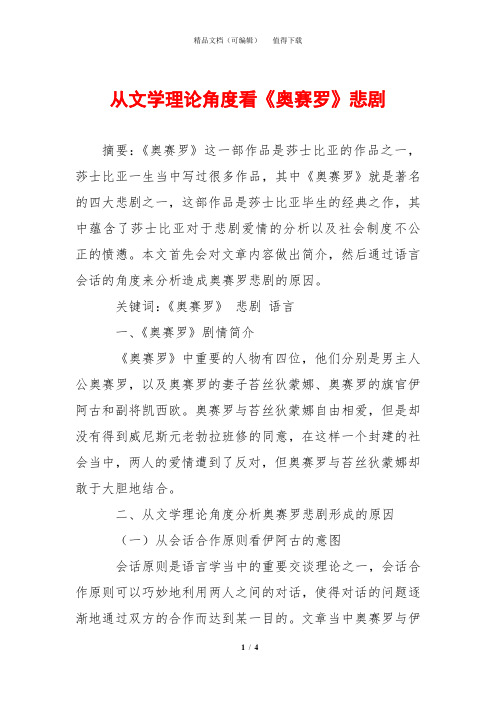
从文学理论角度看《奥赛罗》悲剧摘要:《奥赛罗》这一部作品是莎士比亚的作品之一,莎士比亚一生当中写过很多作品,其中《奥赛罗》就是著名的四大悲剧之一,这部作品是莎士比亚毕生的经典之作,其中蕴含了莎士比亚对于悲剧爱情的分析以及社会制度不公正的愤懑。
本文首先会对文章内容做出简介,然后通过语言会话的角度来分析造成奥赛罗悲剧的原因。
关键词:《奥赛罗》悲剧语言一、《奥赛罗》剧情简介《奥赛罗》中重要的人物有四位,他们分别是男主人公奥赛罗,以及奥赛罗的妻子苔丝狄蒙娜、奥赛罗的旗官伊阿古和副将凯西欧。
奥赛罗与苔丝狄蒙娜自由相爱,但是却没有得到威尼斯元老勃拉班修的同意,在这样一个封建的社会当中,两人的爱情遭到了反对,但奥赛罗与苔丝狄蒙娜却敢于大胆地结合。
二、从文学理论角度分析奥赛罗悲剧形成的原因(一)从会话合作原则看伊阿古的意图会话原则是语言学当中的重要交谈理论之一,会话合作原则可以巧妙地利用两人之间的对话,使得对话的问题逐渐地通过双方的合作而达到某一目的。
文章当中奥赛罗与伊阿古的对话就巧妙地运用了这一方法,两人在进入城堡花园当中,伊阿古故意通过对话引起奥赛罗的注意。
起初伊阿古在与奥赛罗交谈的时候曾经多次停顿,目的就是想要通过多次的停顿来引起奥赛罗的注意,并且在交谈当中伊阿古曾经几番打断奥赛罗的话,这种似乎想要说什么但是却含糊不清的表达方式令奥赛罗心生怀疑。
在奥赛罗与伊阿古对话当中,伊阿古巧妙地回避了奥赛罗的正面问题,而胡乱捏造事实,伊阿古的这种回答方式正是运用了合作会话原则。
(二)从关联原则看奥赛罗的迷茫之处在与奥赛罗的对话当中可以发现,伊阿古还会巧妙地利用语言关联原则来将一些没有的事情指控为真,他将一些本来无关紧要的词汇变成可以引起奥赛罗注意的虚假信息。
伊阿古的这种关联原则在语言的对话当中经常出现。
伊阿古在与奥赛罗对话时候先是说明一个问题,并且每一句话都根据这个问题,层层递推,伊阿古在为奥赛罗分析事情发展状况的时候,给予奥赛罗一个固定的四维空间,而自己则好像旁观者的样子,这种对话状态使得奥赛罗对于伊阿古的推理和分析深信不疑。
读奥赛罗有感

读奥赛罗有感读奥赛罗有感奥赛罗读后感【1】这是一部十分感人又让人十分震撼的爱情悲剧。
那到底是什么原因导致了这场悲剧?导致这场悲剧的原因很多,既有内因,又有外因,其中他的自卑的性格也是起决定作用的因素。
正是由于自卑,奥赛罗才被伊阿古利用,轻信了伊阿古,并使他对婚姻缺少信心,对心爱的妻子缺少信任。
那又是什么使他形成了这种自卑的性格呢?奥赛罗的这种自卑的性格是由其所处的社会环境及其人生经历所造成的,这是他自身无法控制的。
《奥赛罗》是莎士比亚的四大悲剧之一。
该剧讲述了一个悲惨的爱情故事:黑皮肤的奥赛罗是非洲摩尔人,效力于威尼斯军界,因取得了显赫战绩而成为一个令世人侧目的将军。
他常受邀到威尼斯元老家做客,元老勃拉班修之女苔丝狄蒙娜爱上了他,并和奥赛罗私定了终身。
奥赛罗的手下旗官伊阿古由于种种原因,诸如种族的不同、职务的升迁未果等等,而极度仇恨奥赛罗。
于是,伊阿古精心策划,利用罗德列哥的愚蠢,采用造谣、欺骗等手段,使奥赛罗相信苔丝狄蒙娜与他的副将凯西奥关系暧昧。
奥赛罗最终相信了伊阿古的谎言,愤而将苔丝狄蒙娜扼杀。
最后,在伊阿古的妻子爱米利娅的揭发下,真相大白,奥赛罗悔恨莫及,自刎身亡,伊阿古被拘捕。
在当我们读到奥赛罗亲手扼住了他那温柔善良妻子的脖子使其最终停止了呼吸这个场面的时候,我们震惊,我们气愤,我们为善良的苔丝狄蒙娜感到不平,然后我们静下来深思悲剧产生的原因。
其实原因有很多,有外在的,有内在的,而让我感悟最深的是奥赛罗那自卑的性格特征,这种性格对他影响很深,也导致了悲剧的产生。
一、自卑性格的形成原因在心理学上,自卑属于性格上的缺点。
自卑,即一个人对自己的能力、品质等作出偏低的评价,总觉得自己不如人、悲观失望,丧失信心等。
在社交中,具有自卑心理的人孤立、离群、抑制自信心和荣誉感,当受到周围人们的轻视、嘲笑或侮辱时,这种自卑心理会大大加强,甚至以嫉妒、自欺欺人的方式表现出来。
自卑是一种消极的心理状态,是实现理想或某种愿望的.巨大心理障碍。
- 1、下载文档前请自行甄别文档内容的完整性,平台不提供额外的编辑、内容补充、找答案等附加服务。
- 2、"仅部分预览"的文档,不可在线预览部分如存在完整性等问题,可反馈申请退款(可完整预览的文档不适用该条件!)。
- 3、如文档侵犯您的权益,请联系客服反馈,我们会尽快为您处理(人工客服工作时间:9:00-18:30)。
论《奥赛罗》的悲剧根源:自卑[Abstract]Othello is one of Shakespeare’s most famous tragedies. It tells of a tragic love story of Othello, the Moor and general in the service of Venice, and Desdemona, a prestigious Venetian senator Brabantio’s daughter. Under the schemes of Iago, Othello’s ancient , the happy couple end in tragic death. This thesis holds the view point that Othello’s self-contempt is the root cause of the tragedy. If it has not been for his self-contempt, he would not have married her in secrecy without an open and straight propose to the noble family. If it has not been for his self-contempt, the rumors and schemes would have never been taken as truth and proofs. Self-contempt distorts his justice of evil conspiracy and exceeding honesty.[Key words]Othello,tragedy cause,self-contemptI. IntroductionOn the reasons of Othello’s tragedy, the opinions have been various. Some scholars believe that “it is Othello’s dual and inconsistent characteristics that contribute to the tragedy” (Luo, 2002); some deem that it is “the social factors that lead to the ruinous end” (Xiang, 2007); and some attribute to “the racial discrimination and cultural prejudice” (Liu, 2009); and some propose that “the instability of their Platonic loveforeshadows their t ragedy” (Yuan, 2008).To be objective, many factors contribute to harboring and shielding his self-contempt, but these factors are the minor causes to the tragedy of Othello. First comes the Venetian military dependence. Their reliance gives him the possibility to make up with his inferior identity and to expect live a normal life as a Venetian. Second is the senators’compromising on his unlawful marriage to a fair noble lady. It deepens his sense of self-contempt, for as a human being he is nothing and only as a general can he be respected and forgivable. Then come Desdemona’s sweet temper and amiable personality. It is a constant compromise to his rage and abuse.In this thesis, self-contempt as a distorted characteristic, is discussed and proved to be the root cause of the tragedy of Othello and Desdemona. The thesis divides the tragedy into two parts, one is before their marriage, and the other is from after their marriage to the tragic end. Detailed analysis will be given to expound the deduction that self-contempt is the root cause of Othello’s tragedy.Ⅱ. Othello’s Self-contempt before Their MarriageIn psychology self-contempt is a characteristic defect, which is defined as an under-evaluation of one’s ability and character. It shows anunder-estimation, disappointment and lack of confidence of oneself. In social life, self-contemptuous persons feel inferior and alienated to others. When they are mocked or insulted by people, their self-contempt devastates and expresses in the forms of jealousy and self-deception, etc. Othello is self-contemptuous throughout the tragedy before and after he is caught by Iago’s malicious schemes.To begin with, before their secret consummation, Othello has many traces of being self-contemptuous which impact their marriage. He has been passive in their relationship and does not move on without Desdemona’s hint.…It was my hint to speak … she’d come again, and with a greedy ear devour up my discourse; which I, observing, took once a pliant hour and found good means to draw from her a prayer of earnest heart… (Act 1 Scene 3)He acts upon every hint that he has observed. Then he purposefully induces her earnest heart of love and admiration.Secondly, as for the content of their conversation, to some extent, he boasts and exaggerates about his experiences on the battlefield, for the purpose of winning her admiration. This is the presentation of being self-contemptuous.…of being taken by the insolent foe and sold to slavery.… and of the cannibals that each other eat, the anthropophagi, and men whose heads do grow beneath their shoulders. (Act 1 Scene 3)According to the common sense, there indeed cannot be any creatures whose heads grow beneath their shoulders, and therefore lies great possibility that Othello tells these interesting and vivid stories to appeal to Desdemona who has never socialized beyond the domestic sphere, and that he tells his sufferings to gain her sympathy and love.Thirdly, as for the form of their marriage, it is not open and upright but in secrecy. It seems that, when being retorted in public at the council chamber, his behavior (in Act 1 Scene 2) is with great composure and courage. But taken from the other point of view, he has already consummated with Desdemona and, most importantly, at her will. On this condition, Brabantio would have no means to separate them, not to mention there is the favorable fact that Othello is the hero of Venice, the most influential general to protect the peace of both the authority and the citizens. Therefore, it is reasonable to reckon that his secret marriage is due to the lack of confidence for being permitted by Desdemona’s father, as well as by the Venetian authority.Ⅲ. Othello’s Self-contempt after Their MarriageAfter they are permitted reluctantly by the Venetian authority to be lawful couple, they are still a happy couple. However, in their matrimony, Othello’s self-contempt is not cured but deepened. He still carries on his feeling of inferiority, which gives the possibility to falling into Iago’s schemes. It causes his incredulity to Iago, jealousy of Cassio, and suspicion of his wife, and eventually leads their happy marriage to a tragic end.At the beginning of the malicious scheme, if Othello was confident enough his incredulity could have been beaten down and all the following troubles would be saved. However the reality is that in his eyes, Desdemona, is an angel, holy beautiful in both flesh and sole and a white aristocrat noble in social status in a natural way. While himself is a black and ugly Moor, exotic and alien in Venice. The self-contempt is so deep rooted that in his mind, he is taken advantage of to guard the Venetians, otherwise, he is nothing. If it was not for his valiancy and victory in guarding the country, he would never be acknowledged by the authority and noblemen, not to say having the access to them and marry one of their young fair ladies. All his fame and power lies in their dependence on his military intelligent.On the one hand, this recognition sharpens Othello’s awareness that his appearance and age do not match with his wife, and makes himsensitive and devastates his self-contempt. So when hears Iago’s incitation,As, to be bold with you, not to affect many proposed matches of her own clime, complexion and degree, whereto we see, in all things, nature tends — Foh! One may smell in such a will most rank, foul disproportion, thoughts unnatural. (Act 3 Scene 2)This also explains why he cannot help doubting about himself and saying to himself the following remarks,Haply for I am black and have not those soft parts of conversation that chamberers have, or for I am declined in the vale of years —yet that’s not much —(Act 3 Scene 2)On the other hand, Othello is quite clear about how their love develops. It is a pure, Platonic love based on admiration of each other. “Upon this hint I spake: She loved me for the dangers I had passed and I loved her that she did pity them.” (Act 1 Scene 3) T o be specific, Desdemona does admire him for spiritual reason, as the texts tell us “My heart’s subdued even to the very quality of my lord: I saw Othello’s visage in his mind, and to his honours and his valiant parts did I my soul and fortunes consecrate,” (Act 1 Scene 3) However, Othello loves her not only for her pity and admiration. He mentions her fair complexion,beautiful body and sweet temper many times and they are the major part where his love originates in.A fine woman, a fair woman, a sweet woman!O, she will sing the savageness out of a bear! Of so high and plenteous wit and invention! O, a thousand, a thousand times: and then of so gentle a condition. (Act 4 Scene 1)Unfortunately, all her merits and advantages consolidate his self-contempt and suspicion of her infidelity.As the scheme develops, Othello’s suspicion and jealousy grow. But they could have been dissolved if he was courageous to face Desdemona directly in their conversation. Whenever they are in the middle of an interrogation, he evades talking his heart out and forces their communication to a sudden stop, depriving Desdemona of any chance knowing why he is obsessed with such rage, and depriving himself of reaching to the truth. This evasion happens even when they are alone. He calls upon her several times, and as his jealousy and suspicion grows deeper, his attitude devastates and his remarks sharpen. His attention gradually turns from asking her confession out to torturing the innocent and loyal woman. So long has he been imagining about Desdemona’s infidelity with Cassio, so deep has he been tortured by his own creatednightmares. He unconsciously takes the rumor as a fact and gradually loses all his pride as a husband and his honor as a man. His self-contempt is further distorted and uncontrollable rage is seeking an outlet. He calls her ill names and curses her but forgets to tell her why.Besides, he has no courage to face the truth told by her when they are face to face. Unfortunately, when he believes that Cassio is murdered by his conspiracy with Iago, he comes to afflict coercion on Desdemona to confess her “guilt”. But meanwhile, he is determined to kill her at the news of Cassio’s death. He does not get the expected confession and prayer, for she is indeed innocent and loyal to him. He is using a false assumption to prove an imaginary guilt by force. The outcome cannot be nothing else but a surprising misunderstanding.Additionally, Othello has not the courage to investigate on himself, which fails for another time to break the scheme. According to his statement, only on that condition will he believe Desdemona’s infidelity. On the one hand, instead of investigate on himself he insists on Iago to show him a solid proof. On the other hand, his inquiry on Desdemona is, in fact, an outlet of his wrath, not a platform to communicate and exchange ideas. And the only time that he investigates by himself is in Act 4 Scene 2, with great doubt to his object of investigation.All in all, his only inquiry turns out to be fruitless due to his greatdoubt of Emilia’s personality and an even greater inclination of his wife being a “perjured strumpet”. As a result, his act is directed by Iago’s unilateral statement and he loses his judgment which helps him to hold justice. It gives reasons to why every time Iago comes to him with fabricated proofs, Othello accepts all the information and even develops it further.Othello: What? What?Iago: Lie.Othello: With her?Iago: With her, on her, what you will.Othello: Lie with her? Lie on her? We say lie on her when they belied her! Lie with her, zounds, that’s fulsome! Handkerchief! Confessions! Handkerchief! (Act 4 Scene 1)Ⅳ. ConclusionTo conclude, Othello’s self-contempt is the basic reason why he falls into Iago’s malicious scheme and gets misled further and further until his destiny comes to a tragic end. It is also the foundation that nourishes his distorted reliance on honor and fame. In order to protect his honor and fame, he eventually murders Desdemona and pushes thetragedy to the climax. His tragedy is evitable to the extent that Iago never schemes such a trap to destroy their marriage and happiness. On the other hand, it is inevitable to the extent that Iago plays the role of merely a medium, a catalyst of Othello’s jealousy and incredulity that originate in his deep rooted self-contempt.Viewing from this perspective, Othellois not only a love tragedy, but also a social tragedy as it being the poisoned fruit of the complex impacts of defected personality as self-contempt, woman’s position in marriage, and the social authority etc. with the latter two factors influencing the first.【References 】[1]莎士比亚.莎士比亚全集(下册)[M].中国戏剧出版社,1998.[2] 李超.《奥赛罗》悲剧冲突及其根源[J].南昌教育学院学报,2004(4).[3] 李毅.奥赛罗的文化认同[J].外国文学评论,1998(2).[4] 刘迪.奥赛罗和黛斯德蒙娜爱情的悲剧根源[J].作家杂志,2009(1).[5] 刘晓娟,刘春蕾.浅析《奥赛罗》的种族悲剧[J].南平师专学报,2006(1).[6] 罗益民.《奥赛罗》人物形象两面观[J].国外文学,2002(1).[7] 罗振跃.《奥赛罗》悲剧人物的心理分析[J].广东商学院学报,2001(2).[8] 向春林.析《奥瑟罗》悲剧的社会成因[J].怀化学院学报,2007(10).[9] 袁素华.爱情不能承受之重:《奥赛罗》的悲剧[J].安徽文学,2008(5).[摘要]《奥赛罗》是莎士比亚最著名的悲剧作品之一,它讲述了一位摩尔人奥赛罗与显贵的元老勃拉班修之女苔丝狄蒙娜之间的爱情悲剧。
